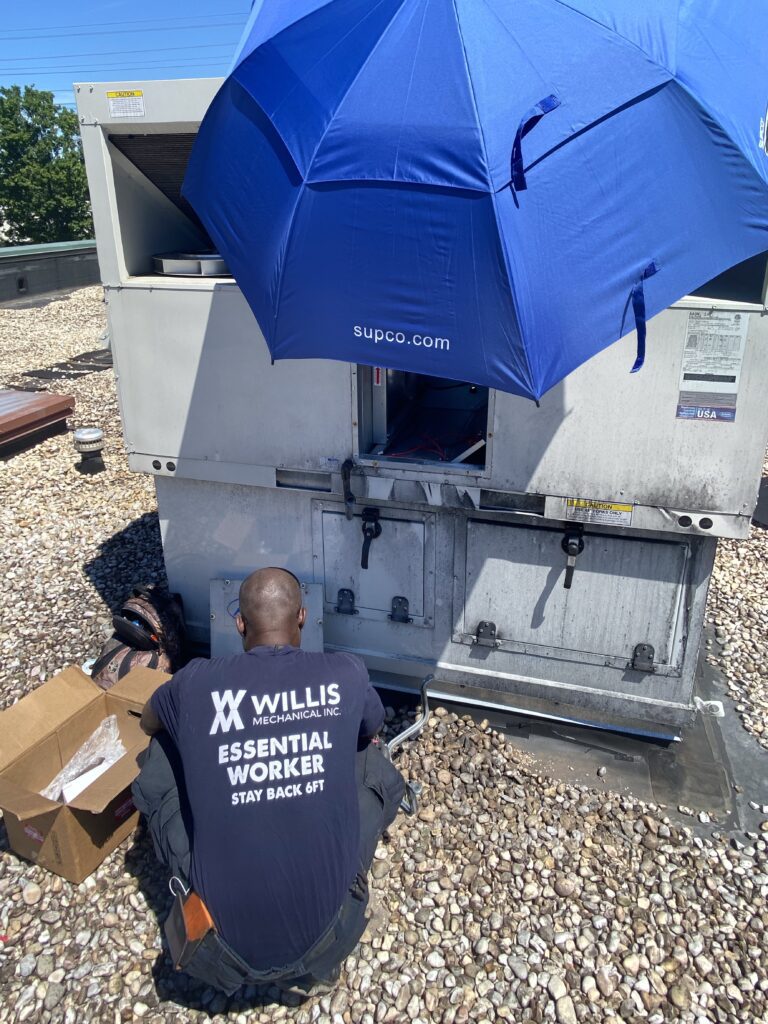Troubleshooting a Scroll Compressor in a Rooftop Unit or Split System: A Technical Guide for Building Owners in Hot Atlanta Summers
As a building owner in Atlanta, you’re well aware of the scorching hot summers that put your HVAC system to the test. Understanding the intricacies of troubleshooting a scroll compressor in your rooftop unit or split system becomes even more crucial. In this technical guide, we will delve into the complexities of scroll compressor troubleshooting, focusing on topics such as compressor performance, measurements, common failures, and compressor replacement. By the end, you will come to appreciate the importance of relying on a trained and insured mechanical contractor to handle these tasks, especially in the face of Atlanta’s blistering summer weather.
- Determining Compressor Performance: When it comes to assessing the performance of your scroll compressor, the demanding Atlanta climate adds an extra layer of importance. Begin by examining the compressor’s electrical operation, ensuring that power is reaching the unit and checking for any electrical anomalies. Once the electrical side is verified, you can proceed to evaluate the mechanical functionality of the compressor, a critical aspect given the extreme conditions it operates under.
- Normal Superheat and Subcool Measurements: In Atlanta’s hot summers, accurate measurements of superheat and subcooling in your comfort cooling DX system become crucial for maintaining optimal performance. Superheat, measured at the suction line, indicates the temperature increase of the refrigerant above its boiling point at a given pressure. Subcooling, measured at the liquid line, reveals the temperature decrease of the refrigerant below its condensing point. While specific values for normal superheat and subcooling can vary depending on the system, it’s essential to consult the manufacturer’s specifications or a professional, especially considering Atlanta’s sweltering climate.
- Common Causes of Scroll Compressor Failure: Given the intense heat and humidity in Atlanta, scroll compressors are susceptible to certain failures. Understanding the common causes can help you appreciate the need for professional assistance. These causes include: a) Insufficient lubrication: Inadequate lubrication leads to increased friction and wear, compromising compressor performance and eventually causing failure. b) Overheating: Restricted airflow, excessive refrigerant pressures, or inadequate oil return can result in high discharge temperatures, leading to compressor overheating and failure. c) Electrical issues: Atlanta’s electrical grid and system fluctuations can impact compressor performance. Voltage fluctuations, improper wiring sizes, or faulty electrical components can cause compressor failure. d) Contamination: The presence of moisture, acid, or debris can contaminate the refrigerant system, damaging internal compressor components and impacting its reliability.
- Determining the Type of Failure: Accurately diagnosing the specific type of compressor failure in the face of Atlanta’s summer weather requires expertise and specialized tools. Mechanical contractors perform tests such as megohm readings, amp draw analysis, and refrigerant system analysis to pinpoint the root cause accurately. Attempting to diagnose the failure without the necessary experience and equipment can lead to misdiagnosis, further damage to the system, and increased discomfort during the sweltering Atlanta summers.
- Procedure and Equipment for Compressor Replacement: When it comes to replacing a scroll compressor in Atlanta’s heat, professional assistance is indispensable. Here’s a brief overview of the general procedure: a) Refrigerant recovery: Properly recovering the refrigerant from the system using approved equipment ensures environmental safety and legal compliance. b) Compressor isolation: Isolating the failed compressor from the refrigerant circuit by closing valves or using isolation tools prevents further damage to the system. c) Compressor removal: Disconnecting electrical connections and removing mounting brackets allows for the safe extraction of the compressor. d) Preparation for replacement: Thoroughly cleaning the system, replacing any contaminated or damaged components, and preparing the new compressor for installation. e) Compressor installation: Carefully installing the new compressor, ensuring proper alignment and connection of all components, is crucial for reliable operation in Atlanta’s demanding climate. f) Evacuation and charging: Evacuating the system to remove contaminants and moisture, followed by charging with the appropriate refrigerant and fine-tuning for optimal performance. g) System testing: Conducting rigorous tests, including leak checks and verifying proper superheat and subcooling values, guarantees the system’s reliability and efficiency in combating Atlanta’s hot summers.
Navigating the technical aspects of troubleshooting a scroll compressor in your Atlanta building’s HVAC system can be daunting. Given the challenges presented by the scorching summer weather, it becomes evident that relying on a trained and insured mechanical contractor is essential. Their expertise, experience, and specialized tools ensure accurate diagnosis, effective resolution of scroll compressor issues, and optimal performance in Atlanta’s demanding climate. Trusting professionals to handle these complex tasks guarantees your equipment receives the necessary care, minimizes risks, and ensures your building remains cool and comfortable even during the hottest of Atlanta summers.

